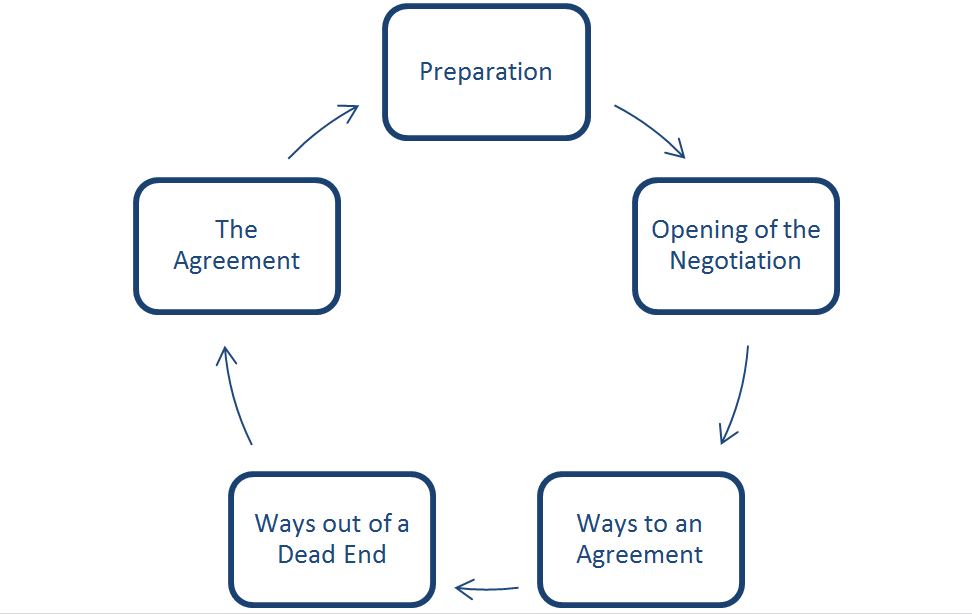This Seminar gives you tips on how to master difficult negotiations. Negotiations always follow the same principles, no matter if you negotiate with your partner or with difficult customers. You always try to feel like a winner. It is almost always true that the wishes of one partner do not match the wishes of the other. The conflict as such is not a problem at first. Many conflicts can be solved by negotiations. The difficulties start when one partner wants to win by all means and thereby drives the other partner into the role of a loser. When that happens there can be no more satisfactory agreement. Then, there will be war – marriage war, price war, war with weapons. Every day we are negotiating with our partners on purchasing, finances, raising our children, on who is to take the trash out and who is to wash the car. We consider most of these negotiations as normal. We know how to best master these everyday situations. After several tries we have a main connecting thread ready in our mind which almost always works. Yet this central idea does not apply to all negotiations. It becomes difficult if we cannot analyze and judge the negotiation partner or the situation. Maybe our lack of information or our lack of negotiation skills will make us unsure of ourselves. Possibly, we are simply scared of the consequences or of our negotiation partner’s presumed or real power.
The Negotiation Process

This is a typical sequence of events within a negotiation. At first you have to do the preparation. During the preparation phase you do not only have to prepare the contents or the objectives of the negotiation, you also have to prepare your strategy and your tactic. Your content preparation is more or less useless if it is not combined with a strategic and a tactic preparation. The next point is the opening of the negotiation. If you have a “bad” start into the negotiation, you lose a lot of position power and your chances for a positive outcome decreases. I recommend you to let your negotiation partner speak first, to take the advantage of the stress and pressure, your opponent feels at the beginning of the negotiation. Experienced negotiators know that there is not only one, respectively “the one and only” way to an agreement. During the preparation phase you have to prepare different ways – strategies and tactics – so that you can react in the right way to the behaviour of your opponent. If you find no ways to an agreement and if you only see the counter position and the interests of your opponent and no longer any common interests, you reached the dead end. To leave the dead end situation, one of the negotiating parties has to give in and therefore to lose his face. It is clear that no one wants to do that, so you have to create a situation – a chance – where your opponent can give in without losing his face. You will come to an agreement, if each side of the negotiating parties feel like a winner and it does not matter whether they really are or not.
Our customized Negotiation & Sales Training Courses help sharpen the skills of even experienced sales reps enabling them to take advantage of sales opportunities and aggressively expand business. Together with our clients we evaluate the sales competencies of the sales force in order to design a tailor-made Course Program. Our didactic concept – We use „learning by doing“ training methodology to support behavior change through interactive training. Using customized cases and exercises, we ensure that participants apply the skills and strategies learned and receive intensive coaching and feedback. We utilize role plays, drills, in-the-action feedback and so on. We supplement learning by doing with some other teaching strategies, including small
The Main Topics:
- The negotiation Process
- Roles in Negotiations
- Objectives in Negotiations
- Principles of difficult Negotiations
- Analyzing the partner before and
during Negotiations - Objective, Stratety and tactic in
Negotiations - Convince with the right arguments
- Take the leadership in Negotiations
- Show your power
- Break any resistence
- Make sure the agrrement is kept in
the longterm
group discussion, drills, flip chart development to capture participant opinions and ideas, and limited Power Point slides
REFERENZEN
ERFOLGSSTORIES
- 12 neue Six Sigma Black Belts bei Electrovac
- BigStep® bei Greiner Extrusion
- Dietzel Univolt – Neuer virtueller Vertriebsprozess zur Neukundenakquisition in Deutschland
- Lean Six Sigma Green Belt Training bei Georg Fischer Fittings erfolgreich abgeschlossen
- Miba Frictec investiert in 11 neue Lean Six Sigma Black Belts
- Mit Six Sigma Projektcoaching € 135.000.- Net Benefit p.a. erzielt
- Scheuch Components – Neuer virtueller Vertriebsprozess zur Unterstützung der Wachstumsstrategie
- Six Sigma bei Dietzel Univolt
- Six Sigma bei Electrovac
- Umsetzung der Wachstumsstrategie 2020 bei Greiner Bio-One North America mit BigStep®
- Umsetzung der Wachstumsstrategie mit BigStep® bei Gabriel Chemie


























